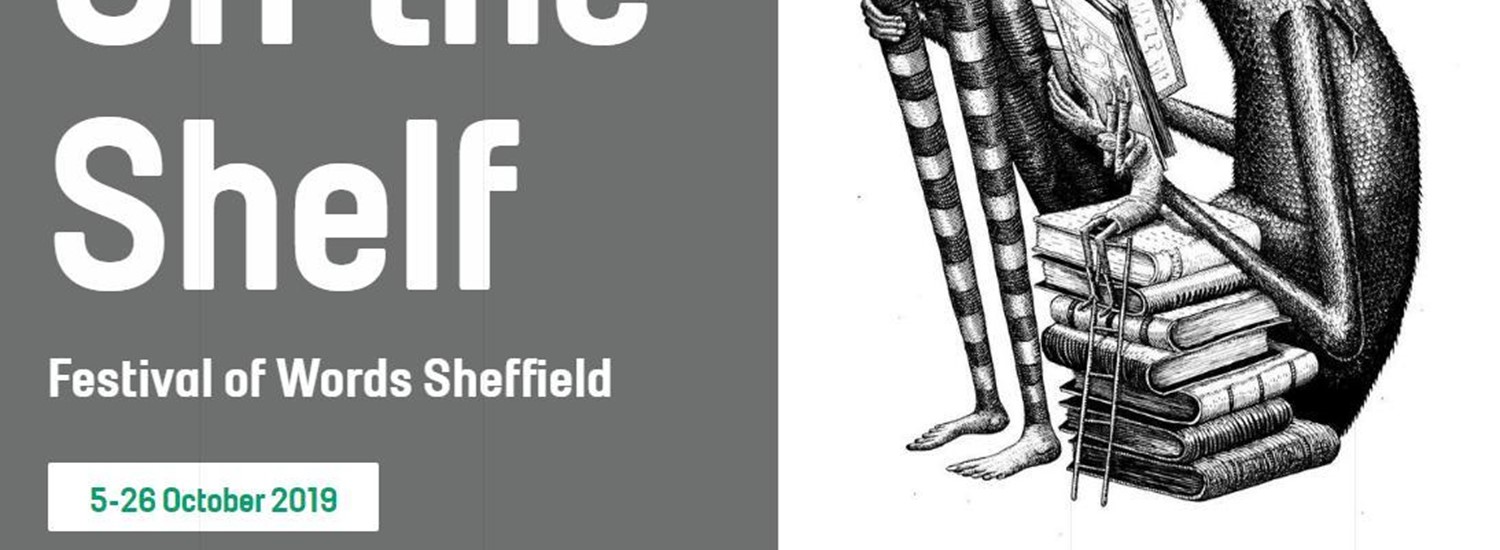Your free music weekender - The Fringe at Tramlines - is back with a jam-packed line-up of talent at Devonshire Green, the Peace Gardens and venues across the city!
Off The Shelf 2019 is the final word in festivals

Have you booked your tickets for this year's Off The Shelf festival, celebrating the very best literature?
We've been out and about sampling some of the talks on offer across the city in the annual festival of words.
Invisible Women – Caroline Criado Perez
The queue snaked out of the door as Sheffield University’s Octagon Centre filled with people excited to hear what Caroline Criado Perez had to say about her new book: Invisible Women: Exposing Data Bias in a World Designed for Men.
When everyone had finally taken their seats in the buzzing auditorium (and a quite a few people had sneaked in late), Perez was welcomed to the stage, accompanied by her adorable little dog.
Starting the discussion with a focus on technology, Perez opened with a stark statistic: studies show that women are 47% more likely to suffer serious injuries in a car crash than men. Cars aren’t actually designed for women, it turns out, who amongst other things are affected by having to sit closer to the steering wheel to reach the pedals and using seat belts that don’t take female bodies into account.
The conversation sped through the vast range of subjects covered in the book; education, medicine, the workplace, relationships.
Did you know that many drugs aren’t tested on women because ‘it’s harder to get them to take part’? Or that home voice recognition software is 70% more likely understand a man’s voice than a woman’s?
The discussion is as lively and witty as it is disturbing, and an hour passes quickly as the audience alternates between nodding in recognition and frowning in disbelief. Invisible Women: Exposing Data Bias in a World Designed for Men
Invisible Women: Exposing Data Bias in a World Designed for Men
When it’s time for questions, hands shoot up across the room.
“What can I personally do to help stop the data bias?” A researcher asks. Perez tells her that it’s a very big question to answer, but as a starting point she should make sure she includes women in her research as much as possible.
Other questions are taken, one interrupted by a crying baby. “All babies are welcome here,” Perez jokes, “no matter their gender.”
The final question comes from a woman who wants to know what Perez does to convey her work to people who aren’t data-minded.
Perez thinks for a minute, shrugs, and says “the thing is, I don’t think I need to. Feelings are subjective and can be interpreted, whereas data shows things as they are. Data is a fact.”
And she’s right. Whatever your opinions are, you can’t argue with the facts.
A Fabulous Creation – David Hepworth
If David’s account of ‘A Fabulous Creation’ is anything to go by then the book certainly lives up to its name.
The Yorkshire-born rock journalist and broadcaster, who launched, edited and published the likes of Smash Hits, Just Seventeen, Empire and The Word throughout the 70s, 80s, 90s and 00s, has enjoyed a long career and great love affair with music.
In his latest work he shares the journey of the birth and life of vinyl records through the memories of a 1960s youth.
His knowledge of the music industry is absolute but it’s his passion that really shines through in his nostalgic chronicle.
David’s account tells of an age where the LP was the only form of replayable entertainment around, no VHS, no rewindable cassettes or walkmans, no CDs, MP3s, Spotify or Shazam.
Hearing first-hand the effect of holding those precious LPs ("the love marks speak to us"), the excitement of discovering new releases, the desperation to get home from work to simply sit and listen to the record again and again and again ("it was a law, we had to do it, we all did it"), was like being transported back in time to feel it yourself.
Whether you lived through the vinyl era, are enjoying its current revival, have only just discovered it or have never even seen a record, connecting with Hepworth’s words is irresistible. He’ll take you through the evolution of vinyl from The Beatles’ ground-breaking ‘Sgt. Pepper’s Lonely Hearts Club Band’ ("the very first cover to have the lyrics on the back") to Michael Jackson’s ‘Thriller’, which changed everything.
Hugely compelling, Hepworth evokes a longing to experience life at a slower pace when there was nothing better to do than listen. A Fabulous Creation indeed.
Lowborn - Kerry Hudson
First up, Kerry Hudson's story is both empowering and invigorating. In conversation with Dr David Forrest as part of the Working Class Voices strand of the festival she tells how she overcame adversity to triumph as one of the most compelling voices in Britain today.
Hudson's book Lowborn is a stunning read of a life which could have ended so differently. Moving from social housing to homeless shelters and caravans in glamorous places such as Great Yarmouth ("my mum was such an optimist" she says, "the next place was always going to be the one where it all went right" before asking the audience "have you ever been to Great Yarmouth?") and Aberdeen, Hudson could easily have been another statistic.
Already drinking heavily in her teens, she was saved by a combination of libraries (the Manic Street Preachers' line "Libraries gave us power" has never rung more true) and a Camp America trip at 18. It ushered in a career as a writer and novelist. Lowborn takes Hudson back to the places she escaped. The name Lowborn is one of many she recounts as badges given to people living in poverty as she returns to the places of her childhood.
She tells Forrest how many things, especially in the cities themselves, have changed, but the edges remain exactly the same. But it is in the social housing projects where she feels most at home, and most of a sense of community.
It should be a bleak night. But it is compelling, captivating and uplifting.



